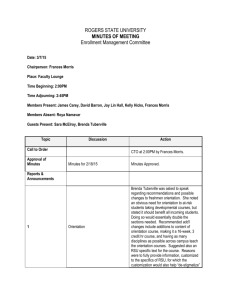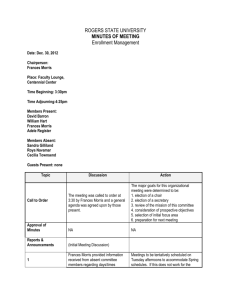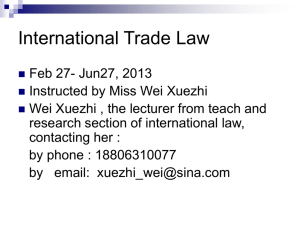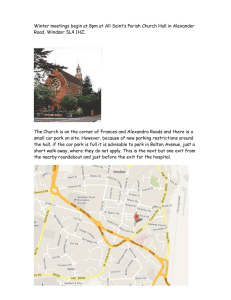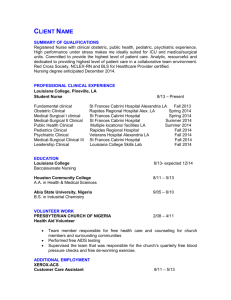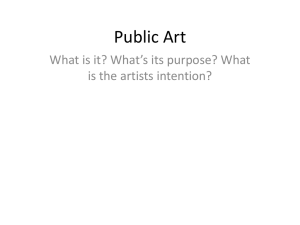NAME: PERIOD: ENGLISH I CRITICAL READING TEST
advertisement
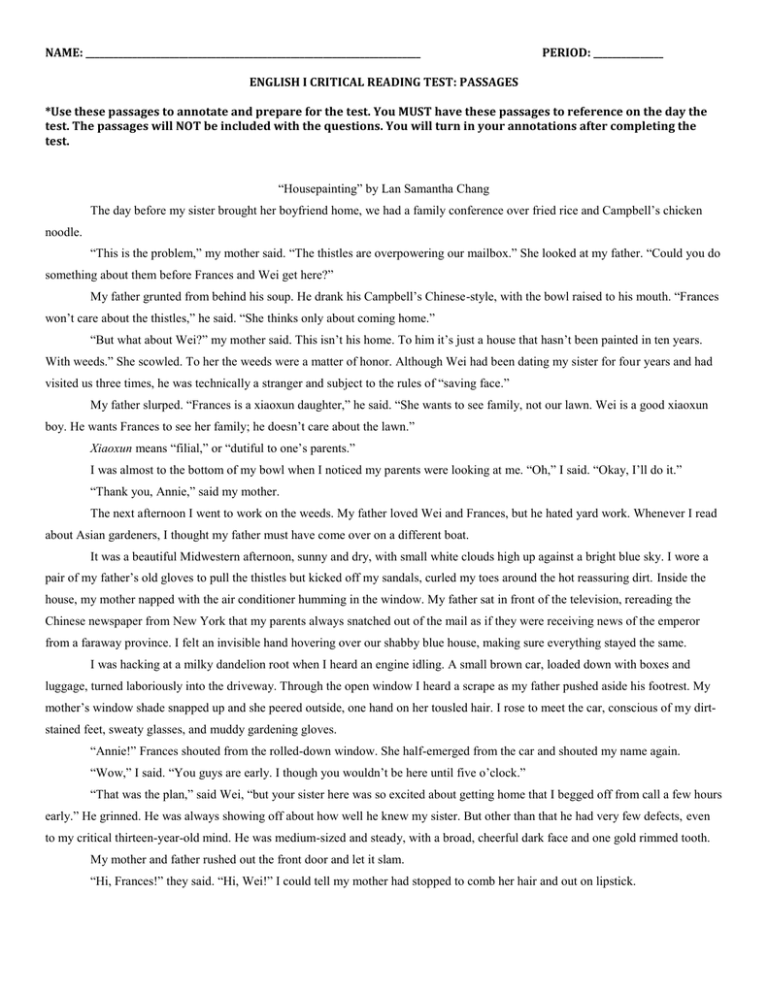
NAME: ________________________________________________________________________ PERIOD: _______________ ENGLISH I CRITICAL READING TEST: PASSAGES *Use these passages to annotate and prepare for the test. You MUST have these passages to reference on the day the test. The passages will NOT be included with the questions. You will turn in your annotations after completing the test. “Housepainting” by Lan Samantha Chang The day before my sister brought her boyfriend home, we had a family conference over fried rice and Campbell’s chicken noodle. “This is the problem,” my mother said. “The thistles are overpowering our mailbox.” She looked at my father. “Could you do something about them before Frances and Wei get here?” My father grunted from behind his soup. He drank his Campbell’s Chinese-style, with the bowl raised to his mouth. “Frances won’t care about the thistles,” he said. “She thinks only about coming home.” “But what about Wei?” my mother said. This isn’t his home. To him it’s just a house that hasn’t been painted in ten years. With weeds.” She scowled. To her the weeds were a matter of honor. Although Wei had been dating my sister for four years and had visited us three times, he was technically a stranger and subject to the rules of “saving face.” My father slurped. “Frances is a xiaoxun daughter,” he said. “She wants to see family, not our lawn. Wei is a good xiaoxun boy. He wants Frances to see her family; he doesn’t care about the lawn.” Xiaoxun means “filial,” or “dutiful to one’s parents.” I was almost to the bottom of my bowl when I noticed my parents were looking at me. “Oh,” I said. “Okay, I’ll do it.” “Thank you, Annie,” said my mother. The next afternoon I went to work on the weeds. My father loved Wei and Frances, but he hated yard work. Whenever I read about Asian gardeners, I thought my father must have come over on a different boat. It was a beautiful Midwestern afternoon, sunny and dry, with small white clouds high up against a bright blue sky. I wore a pair of my father’s old gloves to pull the thistles but kicked off my sandals, curled my toes around the hot reassuring dirt. Inside the house, my mother napped with the air conditioner humming in the window. My father sat in front of the television, rereading the Chinese newspaper from New York that my parents always snatched out of the mail as if they were receiving news of the emperor from a faraway province. I felt an invisible hand hovering over our shabby blue house, making sure everything stayed the same. I was hacking at a milky dandelion root when I heard an engine idling. A small brown car, loaded down with boxes and luggage, turned laboriously into the driveway. Through the open window I heard a scrape as my father pushed aside his footrest. My mother’s window shade snapped up and she peered outside, one hand on her tousled hair. I rose to meet the car, conscious of my dirtstained feet, sweaty glasses, and muddy gardening gloves. “Annie!” Frances shouted from the rolled-down window. She half-emerged from the car and shouted my name again. “Wow,” I said. “You guys are early. I though you wouldn’t be here until five o’clock.” “That was the plan,” said Wei, “but your sister here was so excited about getting home that I begged off from call a few hours early.” He grinned. He was always showing off about how well he knew my sister. But other than that he had very few defects, even to my critical thirteen-year-old mind. He was medium-sized and steady, with a broad, cheerful dark face and one gold rimmed tooth. My mother and father rushed out the front door and let it slam. “Hi, Frances!” they said. “Hi, Wei!” I could tell my mother had stopped to comb her hair and out on lipstick. We stopped blinking foolishly in the sunlight as Wei and Frances got out of the car. My family does not hug. It is one of the few traditions that both my parents have preserved from China’s pre-Revolutionary times. Frances came and stood in front of my mother. “Let me look at you, “ my mother said. Her gaze ran over my sister in a way that made me feel knobby and extraneous. Frances was as beautiful as ever. She did not look like she had been sitting in a car all day. Her white shorts and her flowered shirt were fresh, and her long black hair rippled gently when she moved her head. People were always watching Frances, and Wei was no exception. Now he stared transfixed waiting for her to turn and talk to him, but she did not. Still facing my mother, Frances said, “Wei, could you get the stuff from the car?” “I’ll help you!” my father said. He walked around the back of the car and stood awkwardly aside to let Wei open the trunk. “So, how is medical school?” I heard him ask. They leaned into the trunk, their conversation muffled by the hood. I looked at their matching shorts, polo shirts, brown arms and sturdy legs. When Wei came to visit, my father always acted like a caged animal that has been let outside to play with another of its kind. Afterward, we sat in the kitchen and drank icy sweet green bean porridge from rice bowls. Frances nudged me. “Hey, Annie, I got you something.” She pulled a package wrapped in flower paper from a shopping bag. She never came home without presents for everyone, and she never left without a bag full of goodies from home. It was as if she could maintain a strong enough sense of connection to us only by touching things that had actually belonged, or would soon belong, to us. I looked at the package: a book. I stifled a groan. Frances never knew what I wanted. “Well, open it,” my mother said. I tore off the paper. It was a thick volume about the history of medicine. This was supposed to be of great interest to me, because of a family notion that I would become a doctor, like Wei. I did not want to be a doctor. “This is great! Thanks, Frances,” I said. “Very nice,” said my mother. “Ma, I left your present in my room,” Frances said. “Let’s go get it.” They left the kitchen. My father and Wei began a heated discussion about Wimbledon. After a few minutes, I got bored and went to find my mother and Frances. From the entrance to the hall I could see that the bedroom door was closed. I stopped walking and snuck up to the door on the balls of my feet. I crouched against the door to listen. “I don’t know, Mom,” Frances was saying. She sounded close to tears. “What is it that you don’t know?” my mother asked her. When my mother got upset, her sentences because more formal and her Chinese accent more obvious. “Are you unsure that he really cares about you, or are you unsure about your feelings for him?” “I know he cares about me,” she said. She had answered my mother’s question. There followed a pause in the conversation. Then my mother said, “Well, I think he is a very nice boy. Daddy likes him very much.” “And of course that’s the most important thing,” said my sister, her anger startling me. I wrapped my arms around my knees. “You know that it is not true.” My mother sounded exasperated. “Your father enjoys spending time with other men, that is all. There aren’t very many Chinese men in this area for him to talk to. He also likes Wei because he is capable of giving you the kind of life we have always wanted you to have. Is there something…” she paused. “What is wrong with him?” Frances burst into a sob. “There’s nothing wrong with him. There’s nothing wrong with him. It’s just – oh, I just don’t know – I don’t know.” She was almost shouting, as if my mother didn’t understand English. “You and Dad don’t think about me at all!” I imagined my mother’s face, thin and tight, frozen in the light form the window. “Don’t speak to me that way,” she said stiffly. “I am only trying to help you decide. You are very young. You have never lived through a war. You don’t know about the hardships of life as much as your father and I do.” “I’m sorry,” my sister said, and sobbed ever louder. I got up and snuck away down the hall. My parents often mentioned the war, especially when I complained about doing something I didn’t want to do. If I couldn’t get a ride to the swimming pool, my mother told me about when she was in seventh grade and had to walk to school every day past a lot of dead bodies. My mother was a brave seventh grader who knew how to shoot a gun and speak four dialects. But what did I know? I’d lived in the Midwest my whole life. I ate Sugar Pops and drank milk from a cow. To me, an exciting time meant going downtown to the movies without my parents. That night Wei and Frances and I went to a movie starring Kevin Costner and a blond woman whose name I don’t remember. On the way to the theater the car was very quiet. When we arrived, I stood in line to get popcorn and then went into the dim, virtually empty theater to look for Wei and Frances. I saw them almost immediately. They were quarreling. Wei kept trying to take Frances’ hand, and she just kept snatching it away. As I approached, I heard him say, “Just tell me what you want from me. What do you want?” “I don’t know!” Frances said. I approached. She looked up. “Mmmmm – popcorn! Sit down, Annie. I have to go to the bathroom.” Her look said: don’t you dare say a word. I watched her hurry up the aisle. “What’s wrong with her?” Wei shook his head a minute, trying to dislodge and answer. “I don’t know.” It was my first time alone with him. We sat staring awkwardly at the empty screen. Then he turned to me as if struck by an important thought. “Annie, what would you think if Francie and I got married?” Despite what I had overheard between Frances and my mother, my stomach gave a little jump. I thought about what to say. “That would be nice,” I said. “You think so?” Wei said eagerly. “Listen, can you tell her that? I’ve got to convince her. It’s like she can’t make up her mind. Why do you think that is?” “I don’t know,” I said. “I guess she hasn’t had much practice.” Although I’d never thought about it before, I knew that I was right. Xiaoxun meant that your parents made up your mind. I pictured Wei wrapped up in flowered paper, another gift my sister brought back and forth. Wei sat sunk in his seat, a speculative look on his face. “Hmmm,” he said. “Hmmm.” I began to feel uncomfortable, as if I were sitting next to a mad scientist. “I can’t wait to see this movie,” I said quickly. “Frances and I think Kevin Costner is cute.” I stuffed a handful of popcorn into my mouth. While I was chewing, Frances finally came back and sat down between us. “How about it, Frances?” Wei said. “Do you think Kevin Costner is cute?” I looked at Wei’s face and suddenly realized that he could not look more different from Kevin Costner. “Actually, Frances doesn’t like him,” I blurted out. “I just –“ At that moment the screen lit up, and despite myself, I gave an audible sigh of relief. My father was waiting for us when we got home, under the lamp with the Chinese newspaper, in his sagging easy chair. This habit of waiting had always infuriated Frances, who felt compelled by guilt to return at a reasonable hour. Wei greeted my father cheerfully. “Hi, Mr. Wang. Waiting up for us?” “Oh no,” my father said, regarding Wei with pleasure. “I’m glad you’re still up,” Wei said, with a look of heavy male significance. “I wanted to talk to you about something.” This time I had no desire to listen in on the conversation. I headed for the bathroom as fast as I could. Frances hurried with me. “Aren’t you going to talk with them?” I said. Frances grabbed the doorknob. “Just shut up,” she said. She closed the door behind us, and we stood for a minute in the pinktiled room under the glow of the ceiling light. Frances leaned against the counter and sighed. I sat down on the toilet seat. “You know,” she muttered, “I really do think Kevin Costner is cute.” “Me too,” I said. I stared at the tiny speckle pattern on the floor tiles. From the kitchen we heard a burble of laughter. “Dad really likes Wei,” I said. Frances sighed. “It’s not just Dad. Mom likes him too. She’s just too diplomatic to show it. Dad is more obvious.” She raised her eyebrows. “At least I know exactly where I stand with Dad.” Her words frightened me. “I don’t get it,” I burst out in spite of myself. “Why do you go out with him for four years if you don’t really like him?” Frances ran her hand around a water faucet. “He reminded me of home,” she said. “Why did you sign up for biology instead of art class?” She slid quickly off the counter. “Come on, kiddo, time to hit the sack.” The next morning I slept late. Around eleven I was awakened by a muffled bang near my bedroom window. My mind whirled like a pinwheel: What on earth --? I jumped out of bed and pushed up the bottom of the shade. Two male legs, clad in shorts, stood on a ladder to the right of my window. Then Wei bent down, his smile startling me. He was holding a paintbrush. “What are you doing?” I almost shrieked. “Just giving your father a little help with the house,” he said. I pulled the shade down, grabbed some clothes, and hurried out of my room to find my mother. As I passed Frances’ room, I saw her sitting on her bed, fully dressed, with a completely blank expression on her face. My mother was in the kitchen, cutting canned bamboo shoots into long thin strips. “Where is Dad?” “Don’t shout, Annie,” she said. “He went to the hardware store to match some more paint.” “Why is Wei painting the house?” My mother lined up a handful of bamboo shoots and began cutting them into cubes. “He’s just being helpful.” “Why is Dad letting him be so helpful?” I couldn’t find the right question. Wei must have asked my father if he needed help with the house. Why had my father consented? Why was he accepting help from an outsider? My mother turned and looked at me. “Because Wei wanted to help, that’s all. Why don’t you go wash up? You’re thirteen years old: I shouldn’t have to remind you to wash your face.” The next few days passed in a blur, marked only by the growing patch of fresh pale-yellow paint that grew to cover one side of our blue house and then the back. Wei worked steadily and cheerfully, with minimal help from my father. My mother went outside now and then to give him cold drinks and to comment on the evenness of his job, or something like that. Frances stayed in her room reading. I reported to her. “Leave me alone,” Frances said. I went further into the room and stood in front of her until she looked up. “I said leave me alone, Annie! I’m warning you --” “Well, why don’t you say something about it?” I demanded. “Why didn’t you tell him you didn’t want him to do it?” Her face contorted in something between anger and tears. “I can’t tell him! He won’t even listen to me! He says he’s just doing them a favor!” She bent over her book and flipped her hair angrily in front of her, shielding her face. “Go away!” I left the room. With things at home going so well, my parents left the next morning on a day trip to Chicago. Every now and then they made the four-hour drive to buy supplies – dried mushrooms, canned vegetables – from a Chinese grocery store. After they left, we ate breakfast, with Wei and I making awkward conversation because Frances wouldn’t talk to us. Then Wei got up and went out to the front yard. From an open window I watched him pry the lid off a can of paint and stir with a wooden stick from the hardware store. Frances went out on the front porch and stood at the top of the steps looking down at him. “You can stop now, Wei,” I heard her say. He glanced up, puzzled. “You don’t have to paint today. Mom and Dad aren’t around to see what a dutiful boy you are.” Wei didn’t have a short fuse. He shook his head slowing and looked back down at what he was doing. Frances tried again. “It makes me sick,” she said, “to see you groveling like this around my parents.” Wei didn’t answer. “What is it with you?” she sneered. Finally his eyes flickered. “My painting the house,” he said, “is something between me and your parents. If you don’t like it, why don’t you go pick a fight with them? And why did you wait until they left to pick a fight with me?” Frances’ upper lip pulled back toward her nose. I thought she was sneering at him again, but when she turned back to the house, I realized she was crying. She looked horrible. She slammed the door, rushed past me, and ran into the garage, where she and Wei parked the brown car. Then before Wei and I could stop her, she drove away down the street. She came back in an hour. I sat inside pretending to read a book, but Frances didn’t reenter the house, so I figured she and Wei were talking out there. I was surprised when he came inside. “Where’s Frances?” he said. “I thought she was with you.” “Nope. Just finished the front. I’m about to put a second coat on the south side. Want to take a look?” “Okay.” I put down my book. We walked outside and around the house. There stood Frances with her hair up in a painter’s cap, busily putting blue back over Wei’s work, painting fast, as high as she could reach. Two new cans stood in the grass. She had finished most of the side and had worked almost up to the corner. Frances turned to look at us. There were splotches of blue paint on her hands and clothes. “I liked it better the old way,” she said. She glared at Wei, waiting for him to get angry, but he stood perfectly still. I felt cool sweat break out on my neck and forehead. Finally Wei said, “If you wanted it blue again, you just had to tell me.” Frances threw her brush on the ground and burst into tears. She shouted at Wei, “I hate you! You too, Annie! I hate both of you! I hate everything!” She looked at the house. “I don’t care what color it is, I just hate everything!” I took a step backward, but Wei walked right up to her and put his hand on her shoulder. Frances hid her face in her hands and sobbed. They stood like that for a long time, Frances crying and mumbling under her breath, and then she began to repeat one sentence over and over. I leaned forward, straining to make it out. “Mom and Dad are going to kill me.” Wei looked relieved. “If we all start now, we can probably paint yellow over it before they get home,” he said. Two days later Wei finished the house. He and my father drove to the hardware store to buy white paint for the trim. I was sitting in the family room, listlessly leafing through a Time magazine, when Frances stopped in the door. “Hey, Annie. Wanna go out and take a look?” “Okay,” I said, surprised by her sudden friendliness. We walked out the front door, crossed the street, and stood facing the house. The street lamps had just turned on, and the house glowed gently in the twilight. Our raggedy lawn and messy garden were hidden in the shadows. We stood for some time, and then Frances said, “I told Wei that I would marry him.” I looked at her. Her face was expressionless in the glow from the street lamp. Finally she turned and briefly met my eyes. “It’s not worth the trouble,” she said. “Let’s not talk about it anymore, okay?” “Okay,” I said. Without talking, we crossed the street and approached the house. It was a beautiful evening. My mother stood behind the kitchen window, washing the dishes. Frances walked smoothly at my side, her long hair flowing back in the dusk. I glanced up at the rood in a hopeful way, but the imaginary hand that had hovered over our home had disappeared. I blinked my eyes a couple of time and looked again, but it was gone. “Come on, Annie,” my sister said, holding the door. “Hurry up, or the mosquitoes will get in.” I took a deep breath and went outside. “The Sower” by Victor Hugo “To Be of Use” by Marge Piercy Peaceful and cool, the twilight grey Draws a dim curtain o’er the day; While in my cottage-porch I lurk And watch the last lone hour of work. The people I love the best jump into work head first without dallying in the shallows and swim off with sure strokes almost out of sight. They seem to become natives of that element, the black sleek heads of seals bouncing like half-submerged balls. The fields around are bathed in dew, And, with emotion filled, I view An old man clothed in rags, who throws The seed amid the channeled rows. His shadowy form is looming now High o’er the furrows of the plough; Each motion of his arm betrays A boundless faith in future days. He stalks along the ample plain, Comes, goes, and flings abroad the grain; Unnoted, through the dreamy haze With meditative soul I gaze At last, the vapours of the night Dilate to heav’n the old man’s height, Till every gesture of his hand Seems to my eyes sublimely grand! I love people who harness themselves, an ox to a heavy cart, who pull like water buffalo, with massive patience, who strain in the mud and the muck to move things forward, who do what has to be done, again and again. I want to be with people who submerge in the task, who go into the fields to harvest and work in a row and pass the bags along, who are not parlor generals and field deserters but move in a common rhythm when the food must come in or the fire be put out. The work of the world is common as mud. Botched, it smears the hands, crumbles to dust. But the thing worth doing well done has a shape that satisfies, clean and evident. Greek amphoras for wine or oil, Hopi vases that held corn, are put in museums but you know they were made to be used. The pitcher cries for water to carry And a person for work that is real.
